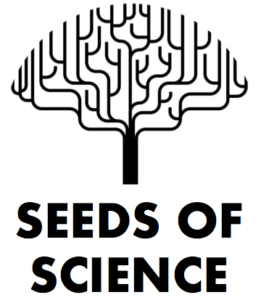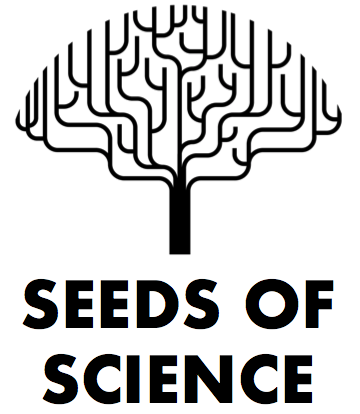
A large number of scientists believe the scientific publishing ecosystem is quite broken, in the sense that it favors flashy improbable findings over rigorous research. This positivity and novelty bias is so strong that some large proportion of newly claimed findings are actually ‘false positives’ or at best grossly overestimated. On top of this, there is somehow also a bias against heterodox findings. Just try publishing on heterodox topics and soon you will be labeled a crank, lunatic, or pseudoscientist. So, how to fix things? Well, many think we need to make new publishers that avoid some problems with the current system. The Seeds of Science is another such attempt. They describe it in their manifesto:
Seeds of Science (ISSN: 2768-1254) is a new scientific journal and community that aims to address some of the issues in the publishing landscape by providing a unique peer-reviewed platform for non-traditional scientific writing.
More broadly, Seeds of Science is an experiment in publishing and community building that hopes to find some initial answers to the following questions:
Can we create new organizations that encourage creativity and diversity of thought in the sciences?
How many new ideas never see the light of day or receive the attention they deserve because of our current scientific publishing system?
Can people outside of traditional academic science (or at the lower levels of it) make valuable contributions if given the proper platform and support?
What follows is a quick introduction to our model and a short discussion of how it attempts to address a few of the problems in scientific publishing.
Our Model in Brief
Ultimately, Seeds of Science has one criterion – does the article contain original ideas that have the potential to advance science in any way? We believe it is important to remain as open-minded as possible about what constitutes a valuable scientific contribution – it could be a speculation, an idea for an experiment or approach, a novel observation, a thought-provoking question and analysis, the noting of an under-appreciated problem, or an unorthodox research study. If you can make a clear and convincing case (in less than 2500 words) for how your ideas could advance science in some way (either directly or very indirectly), then you have a good shot at getting published. Other than that, there are virtually no requirements on content or style – articles (or “Seeds of Science” as we call them) can be from any scientific discipline (including metascience, science ethics, and science education) and can be written in non-traditional formats for scientific articles (e.g. narratives, dialogues, etc.). Citations are encouraged, but not required, and the same goes for humor and poetic license.
This tweet provides a useful way of thinking about the philosophy and aims of Seeds of Science (and gets bonus points for allowing us to continue the plant metaphor).
I guess the forest observing moments are difficult to convert to papers … reviewers like you to talk about trees … better still the bark of the trees.
— Neil Lawrence (@lawrennd) June 19, 2021
Seeds of Science wants to make it easier to convert those ‘“moments of forest observation” into papers(not literal papers though, we are fully digital ;).
The publication process is designed to be as easy and as quick as possible – authors can submit a simple word document and we will take care of formatting and typesetting after the article is accepted. Our hope is that writing and reading a Seeds of Science article will be a much easier and more enjoyable process than is typical for the vast majority of scientific papers. Although our “Seeds” may be different in content and style than a typical scientific paper, it should be noted that all articles receive DOIs and are searchable in major academic databases. Please see our two example articles to get a better sense of our format and what an article will look like upon publication (note: by no means do these articles represent the diversity of content and formats that we hope to publish).
All good and stuff, but the matter of every publishing system is how the gatekeeping, filtering, that is, publication approval is done. Peer review, editor review, something else?
How Does Peer Review Work?
Peer review is crowdsourced yes/no voting and commenting (optional) by our diverse network of reviewers (“Gardeners”) from across science (note: voting is entirely at will – gardeners can ignore any article for any reason. You are not committing to anything by signing up to be a gardener!). Our peer review isn’t a fully objective or systematic process (as if that was possible), and unlike other journals, we aren’t going to act like it is. If a significant majority of Gardeners vote to accept your Seed then it is almost certain we will publish it. If slightly over 50% vote to accept your Seed, but a few commenters raise serious objections or only a small percentage of Gardeners decide to vote (perhaps because the paper isn’t that interesting) then we may issue a rejection. The converse is possible as well – if a Seed receives under 50% of the vote but generates some very positive comments then we may opt to publish it.
We certainly expect our review process to evolve as Seeds of Science grows (heh), but we believe it is important to start with a “flatter”, more democratic procedure in order to serve as a counterbalance to the highly hierarchical nature of academic publishing and modern science in general (see below).
So their system is close to that used by OpenPsych. The gardeners are the review board members. But they add an editorial layer on top of it. I don’t know how much this will help, but it is up to them to prove.
The content of their new journal seems to be pretty much anything goes, so in that sense, it is the same was PLOS1 and other so-called mega-journals.
I am all for experimentation in science. I published 21 papers on another early experimental service The Winnower. It did not succeed, but some lessons were learned. I think the mean lesson is that 1) academics won’t publish places without any kind of approval, because they need papers to count for their CVs for hiring, and 2) one cannot rely on people just commenting on papers out of their own will without someone asking them to do this. SoS seems to have the same problem here, but maybe their meta-gardeners will ask the gardeners to comment on papers (this maybe introduces some selection bias in who comments).
So you’re wondering, who is behind this? Another set of evil racists? I’m afraid to disappoint, read their list of gardeners here. It is by the pseudonymous author Roger’s Bacon (excellent blog) who is apparently a “High School Biology Teacher”. Don’t let this discourage you. After all, Gwern has no credentials and Scott Alexander has the anti-credential of being a psychiatrist. Both are greater than 99.9% of academics.
